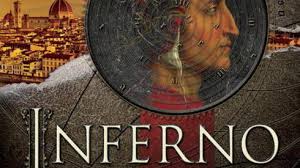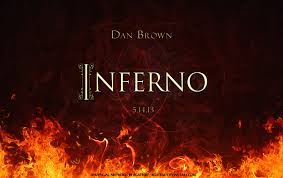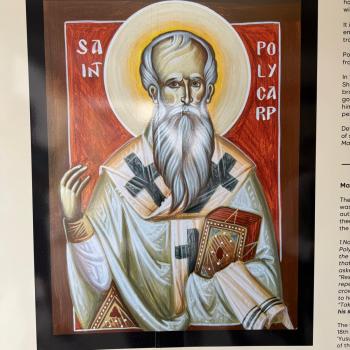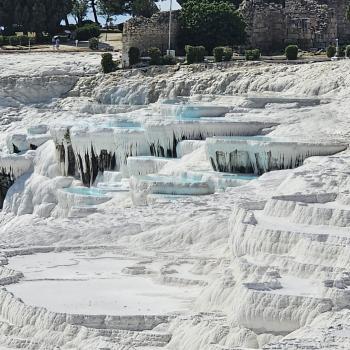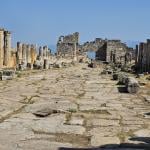I have not been a part of ‘Brown nation’ in the past, nor a big fan of his novels. The Da Vinci Code alone had more than 150 historical and religious errors in it, and was certainly not grande litterature. Was he capable of a mot juste— not really. Was it a fun page turner? Sure.
But in the case of Brown’s latest Robert Langdon thriller, some things have improved markedly, and some things haven’t. Inferno is a bio-terrorism thriller about a brilliant but apparently bonkers scientist named Bernard Zobrist. He calls himself a trans-humanist, and he believes that the only way for humankind to have a future at all is by the culling of the species. In other words he is worried about what used to be called ‘the population bomb’, noting that humankind has doubled in number on this planet just in the 20th century alone, and unless the rate of new births is dramatically reduced, within another 100 years we will have pandemics, famines etc. due to huge over population issues especially in the increasingly urban areas of the world.
Standing against him is one Dr. Sinsky the head of WHO– the world health organization dedicated to the process of disease control and indeed cure of diseases. Zobrist thus sends out a warning message, he has left a ticking chemical time bomb somewhere in the world which, when it goes off, will decimate much if not all the human population. Clue– Zobrist is a geneticist by trade.
Robert Langdon finds himself sucked into being a specialist consultant in the race against time to find the ‘bomb’, so to speak, because, Mr Zobrist has left clues connected to the location of the ‘bomb’, clues from the first book of the classic trilogy The Divine Comedy by Dante, the book entitled ‘Inferno’. This is indeed a perfect read for Halloween!
The novel begins with Langdon waking up in a hospital in Florence, Italy, the home town of Dante, sown up from an apparent gun shot wound. But this, like so many other features in this novel, are not what they seem to be. Brown explores the whole phenomenon of loss of short term memory, caused by a recent traumatic event in the past… in other words he explores the issue of amnesia. He also explores at length the religious issues of Hell. It would be interesting to read Rob Bell’s Love Wins, back to back with this novel, and see what juxtapositions emerge.
There are a few problems with the plotting in this novel. For example, too much of the novel is one long chase scene, with apparent bad guys desperately trying to trap, catch, maybe kill Langdon, who seems to have more lives than my cat, and more escapability than Houdini. Sometimes this gets pushed so far that one can no longer suspend one’s disbelief.
Brown’s best skill is plotting, and surprising twists in the tale, and these are not lacking in this novel. It is also rich in detail about bella Firenze, which is fun as well, and you get to contemplate the meaning of Dante’s terz rima— his poetic verse in Inferno. All of this is good.
Another real problem with this novel is its lack of real, normal people. Instead you have a long list of radical individualists who have no spouses, children or family— including Langdon, Zobrist, Kinsky, and the new female interest in the novel– the brilliant but damaged Sienna Brooks (and whose side is she on anyway??). I must complain as well about the lack of good, never mind clever dialogue, and a better job could have been done on the descriptions. There is plenty of the latter in the novel, but it nowhere approaches the level of skill of say a P.D. James, much less eloquence.
To borrow a line from ‘Gladiator’ if the question is— ‘are you not entertained?’ Then yes, this novel is quite entertaining. It’s plot rolls along like a snowball always gathering momentum, and it is hard to put down, even at a robust 463 pages. This is Brown’s best novel, and it answers that perennial question—- ‘What can Brown do for you?”
If the question is— ‘are you not better informed?’ about say, communicable diseases, Dante, Florence, the history of Venice, Istanbul, then the answer is yes, but one has to do fact check on the ole boy from time to time, despite his penchant for robust claims at the beginning of the novel that the historical and artistic details are all accurate. Once bitten, twice shy. This was definitely not true with the Da Vinci Code. He did mo’ better this time around. Indeed, I am willing to say again this is Brown’s best novel and so much better than the Lost Symbol, his last big one.
‘Inferno’ is the perfect kind of novel to read while baking on the beach in the summer, as it is about a this worldly heated reality, not really about the afterlife. It is about hell on earth, not inferno in the next life. But then, if you don’t believe in the afterlife, then you have to do all you can to prevent this one from becoming ‘a living hell’.
And like Dante, apparently, Brown seems to think you can visit hell, and come back from the brink, going on to purgatory if not heaven thereafter. But Brown envisions this happening here in this world with enough good science, well meaning scientists, and trans-human values. My response to that is that this is the ultimate naivete, or to borrow a line from Dante who certainly did not believe human beings can save the world, never mind save themselves— ‘abandon hope, all ye who enter here….’


